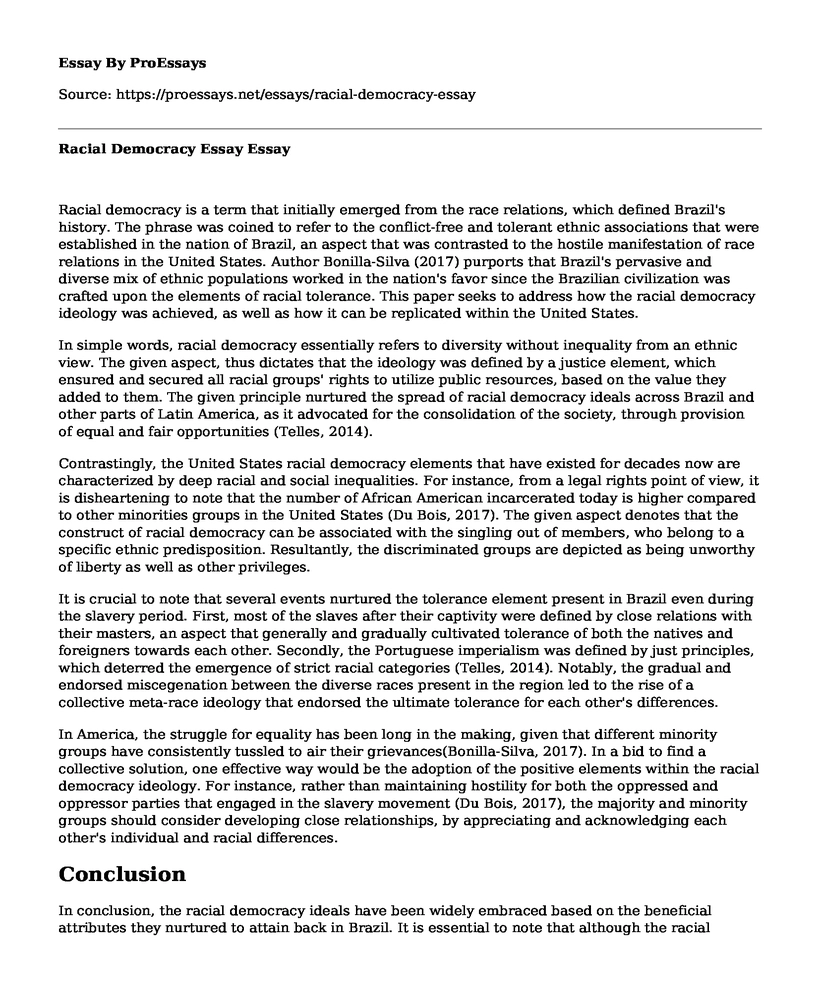Racial democracy is a term that initially emerged from the race relations, which defined Brazil's history. The phrase was coined to refer to the conflict-free and tolerant ethnic associations that were established in the nation of Brazil, an aspect that was contrasted to the hostile manifestation of race relations in the United States. Author Bonilla-Silva (2017) purports that Brazil's pervasive and diverse mix of ethnic populations worked in the nation's favor since the Brazilian civilization was crafted upon the elements of racial tolerance. This paper seeks to address how the racial democracy ideology was achieved, as well as how it can be replicated within the United States.
In simple words, racial democracy essentially refers to diversity without inequality from an ethnic view. The given aspect, thus dictates that the ideology was defined by a justice element, which ensured and secured all racial groups' rights to utilize public resources, based on the value they added to them. The given principle nurtured the spread of racial democracy ideals across Brazil and other parts of Latin America, as it advocated for the consolidation of the society, through provision of equal and fair opportunities (Telles, 2014).
Contrastingly, the United States racial democracy elements that have existed for decades now are characterized by deep racial and social inequalities. For instance, from a legal rights point of view, it is disheartening to note that the number of African American incarcerated today is higher compared to other minorities groups in the United States (Du Bois, 2017). The given aspect denotes that the construct of racial democracy can be associated with the singling out of members, who belong to a specific ethnic predisposition. Resultantly, the discriminated groups are depicted as being unworthy of liberty as well as other privileges.
It is crucial to note that several events nurtured the tolerance element present in Brazil even during the slavery period. First, most of the slaves after their captivity were defined by close relations with their masters, an aspect that generally and gradually cultivated tolerance of both the natives and foreigners towards each other. Secondly, the Portuguese imperialism was defined by just principles, which deterred the emergence of strict racial categories (Telles, 2014). Notably, the gradual and endorsed miscegenation between the diverse races present in the region led to the rise of a collective meta-race ideology that endorsed the ultimate tolerance for each other's differences.
In America, the struggle for equality has been long in the making, given that different minority groups have consistently tussled to air their grievances(Bonilla-Silva, 2017). In a bid to find a collective solution, one effective way would be the adoption of the positive elements within the racial democracy ideology. For instance, rather than maintaining hostility for both the oppressed and oppressor parties that engaged in the slavery movement (Du Bois, 2017), the majority and minority groups should consider developing close relationships, by appreciating and acknowledging each other's individual and racial differences.
Conclusion
In conclusion, the racial democracy ideals have been widely embraced based on the beneficial attributes they nurtured to attain back in Brazil. It is essential to note that although the racial ideology was discarded in Brazil, its emergence in the region laid down various founding principles of attaining tolerance, despite the current differences. America as a nation should consider adopting some values from the ideology if it is to embrace equality among its diverse racial demographic successfully.
References
Bonilla-Silva, E. (2017). Racism without racists: Color-blind racism and the persistence of racial inequality in America. Rowman & Littlefield.
Du Bois, W. E. B. (Ed.). (2017). Black reconstruction in America: Toward a history of the part which black folk played in the attempt to reconstruct democracy in America, 1860-1880. Routledge.
Telles, Edward E. (2014). Race in another America: The significance of skin color in Brazil. Princeton University Press.
Cite this page
Racial Democracy Essay. (2022, May 17). Retrieved from https://proessays.net/essays/racial-democracy-essay
If you are the original author of this essay and no longer wish to have it published on the ProEssays website, please click below to request its removal:
- President Trump's Immigration Policy Essay
- Paper Example on National Party Committees
- Gender Roles in Society Today Paper Example
- Essay Sample on Witch Craft and the Salem Witch Trials
- Media Exposure and Violent Crimes - Essay Sample
- Socialism: A System of Collective Ownership and Government Control - Essay Sample
- Essay Example on Municipalities: Balancing Local, Provincial and National Interests







